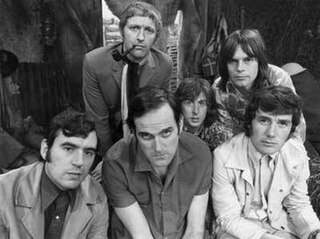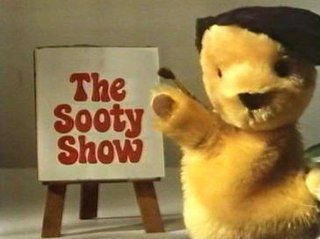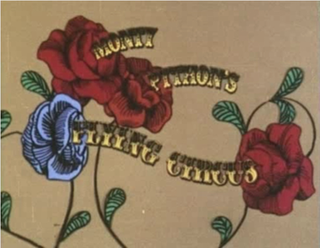Related Research Articles

Monty Python were a British comedy troupe formed in 1969 consisting of Graham Chapman, John Cleese, Terry Gilliam, Eric Idle, Terry Jones, and Michael Palin. The group came to prominence for the sketch comedy series Monty Python's Flying Circus, which aired on the BBC from 1969 to 1974. Their work then developed into a larger collection that included live shows, films, albums, books, and musicals; their influence on comedy has been compared to the Beatles' influence on music. Their sketch show has been called "an important moment in the evolution of television comedy".

Ronald William George Barker was an English actor, comedian and writer. He was known for roles in British comedy television series such as Porridge, The Two Ronnies, and Open All Hours.
In film, television, and radio, British comedy has produced some of the most renowned characters in the world. In it, satire is one of the features of Biritsh comedy. Radio comedy in Britain has been almost exclusively hosted on BBC.

At Last the 1948 Show is a satirical television show made by David Frost's company, Paradine Productions, in association with Rediffusion London. Transmitted on Britain's ITV network in 1967, it brought Cambridge Footlights humour to a broader audience.
Variety show, also known as variety arts or variety entertainment, is entertainment made up of a variety of acts including musical performances, sketch comedy, magic, acrobatics, juggling, and ventriloquism. It is normally introduced by a compère or host. The variety format made its way from the Victorian era stage in Britain and America to radio and then television. Variety shows were a staple of English language television from the late 1940s into the 1980s.
Stanley Livingstone Baxter is a Scottish actor, comedian, impressionist and author. Baxter began his career as a child actor on BBC Scotland and later became known for his British television comedy shows The Stanley Baxter Show, The Stanley Baxter Picture Show, The Stanley Baxter Series and Mr Majeika.

Rainbow is a British children's television series, created by Pamela Lonsdale, which ran from 16 October 1972 until 6 March 1992, made by Thames Television. The series was revived by Tetra Films from 10 January 1994 until 24 March 1997, in two different formats from the original Thames series, with differing cast members. The series was originally conceived as a British equivalent of Sesame Street.

The Sooty Show is a British children's television series, created by Harry Corbett, and produced for the BBC from 1955 to 1967, and then for ITV from 1968 until 1992. The show, part of the Sooty franchise, focuses on the mischievous adventures of the glove puppet character of the same name, alongside his friends Sweep and Soo, and their handler. Between 1955 and 1975, Corbett presented the programme until his retirement, before it was taken over by his son Matthew Corbett. It also co-starred Marjorie Corbett as the voice of Soo from the character's debut in 1964, until her retirement in 1981, whereupon Brenda Longman replaced her.

Very Important Person is a 1961 British comedy film directed by Ken Annakin and written by Jack Davies and Henry Blyth. The cast includes several well-known British comedy and character actors, including James Robertson Justice, Stanley Baxter in a dual role as a dour Scottish prisoner and a German prisoner-of-war camp officer, Eric Sykes, John Le Mesurier, Leslie Phillips and Richard Wattis.

The Magnificent Seven Deadly Sins is a 1971 British sketch comedy film directed and produced by Graham Stark. Its title is a conflation of The Magnificent Seven and the seven deadly sins. It comprises a sequence of seven sketches, each representing a sin and written by an array of British comedy-writing talent, including Graham Chapman, Spike Milligan, Barry Cryer and Galton and Simpson. The sketches are linked by animation sequences overseen by Bob Godfrey's animation studio. The music score is by British jazz musician Roy Budd, cinematography by Harvey Harrison and editing by Rod Nelson-Keys and Roy Piper. It was produced by Tigon Pictures and distributed in the U.K. by Tigon Film Distributors Ltd.

Sez Les is a British sketch comedy show that starred Les Dawson. It was produced by Yorkshire Television, and aired on ITV from 1969 to 1976. Les Dawson and Roy Barraclough regularly performed together as the characters Cissie and Ada. John Cleese appeared in a few sketches in series 3 and appeared regularly in series 8 and 9. Other cast members included Norman Chappell, Brian Glover, Brian Murphy, and Kathy Staff. Music for series 1-5 and 7-8 was provided by Syd Lawrence and his orchestra.

The Baxters is a sitcom that aired in broadcast syndication from September 1979 to August 1981. The original American incarnation of the series aired locally from 1977 to 1979 on the Boston station WCVB-TV; in 1979, Norman Lear took over production, and a recast version aired nationally in the 1979–80 television season. Facing cancellation, the series was then acquired by a Canadian firm who moved the production to Toronto, Ontario and recast it again; it lasted one more season as a Canadian series before ending its run in 1981. It is not to be confused with the 2018–2019 Lightworkers Media television series of that name based on the novels of Karen Kingsbury and starring Roma Downey.

James Hamilton Bachman is an English comedian, actor and writer. He has written for and acted in many British television and radio programmes, including That Mitchell and Webb Look, Saxondale, Bleak Expectations and Sorry, I've Got No Head. In 2014, he had a small role in the film Transformers: Age of Extinction.

Wood and Walters is a British television comedy sketch show starring Julie Walters and Victoria Wood for Granada Television and written entirely by Wood. The show was short-lived, with one pilot in 1981 and a series of seven shows in 1982.

Monty Python's Flying Circus is a British surreal sketch comedy series created by and starring Graham Chapman, John Cleese, Eric Idle, Terry Jones, Michael Palin, and Terry Gilliam, who became known collectively as "Monty Python", or the "Pythons". The first episode was recorded at the BBC on 7 September 1969 and premiered on 5 October on BBC1, with 45 episodes airing over four series from 1969 to 1974, plus two episodes for German TV. A feature film adaptation of several sketches, And Now for Something Completely Different, was released in 1971.
The Les Dawson Show was a variety show that aired on BBC1 intermittently from 1978 through 1989. The show starred comedian Les Dawson (1931–1993), who had previously starred in the ITV sketch comedy programme Sez Les (1969–76), followed by Dawson and Friends (1977). The Les Dawson Show also featured sketch comedy, as well as stand-up comedy, guest appearances, dance numbers, and musical performances.

The Stanley Baxter Picture Show is a British comedy television show which was originally broadcast on ITV. It featured an initial series of four episodes in 1972, followed by one-off specials in each of the successive years. A sketch show it largely followed the same format of Baxter's successful BBC series The Stanley Baxter Show.
The Stanley Baxter Series is a British comedy television show which was originally broadcast on the ITV in 1981. It was Baxter's first weekly sketch show for nine years since the first series of his The Stanley Baxter Picture Show, as he had concentrated on producing one-off specials since then. Baxter was nominated for the British Academy Television Award for Best Entertainment Performance losing out to Nigel Hawthorne for Yes Minister.
Where Do I Sit? was a chat show hosted by the English comedian Peter Cook. It was broadcast on BBC 2 in February 1971. It was cancelled after 3 episodes. The series was produced by the comedy producer Ian MacNaughton.
Richard Searle Drewett (1935–2008) was a British television executive producer specialising in talk shows and light entertainment from the 1960s to the 1990s. Working for BBC Television and London Weekend Television and later with his company Watchmaker Productions, Drewett played a key role in the development of the television talk show. He started in television as one of the pioneering producers of the 1960s arts and review show Late Night Line-Up and in a career of nearly 40 years, during which he won three British Academy of Film and Television Arts BAFTA Awards, he developed long-running professional partnerships with presenters Michael Parkinson and Clive James and promoted the television career of Barry Humphries in his comedic alter-ego Dame Edna Everage. He is respected for having promoted the early careers of a number of noted female television producers and executives.